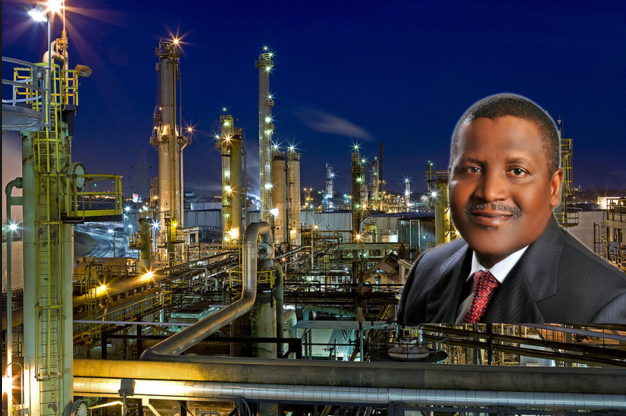OPEC, which stated this in its latest World Oil Outlook (WOO), disclosed that the addition was estimated at 1.2 million barrels per day in the medium term, stressing that the refinery which has a capacity of 650, 000 barrels per day, would take the lion’s share.
Apart from the asset owned by Africa’s richest man, also expected to begin production in the near future are that 100 tb/d refinery to be built in Soyo, Angola, the 110 tb/d Hassi Messaoud refinery expansion in Algeria, the 160 tb/d Midor refinery expansion in Egypt, the 10 tb/d Brahms modular refinery in Guinea and the 110 tb/d Pointe Noire II refinery in the Republic of Congo.
In addition, Ghana and Senegal are also expected to commission new units, most of which are modular, to address fast-growing demand in Africa.
“In Africa, medium-term distillation additions are estimated at around 1.2 mb/d. More than a half of this number is accounted for by Nigeria’s Dangote refinery (650 tb/d).
“According to recent reports, its commissioning is likely to be delayed from 2022 to 2023, partly due to financial issues. Furthermore, Nigeria is likely to see the addition of a number of small modular refineries with capacities of up to 20 tb/d over the medium-term, thus adding much needed capacity in the country,” OPEC stressed.
“Elsewhere, a new 100 tb/d refinery is likely to be built in Soyo, Angola in 2025. In North Africa, a modest expansion is expected in Algeria (Hassi Messaoud) and Egypt (Midor and Assiut).
“Finally, several sub-Saharan countries, including Ghana, Guinea, Senegal and the Republic of the Congo are expected to commission new units, most of which are modular. With these expansions, the region will look to address fast growing demand, but it could also potentially reduce product imports from other regions,” OPEC noted.
In addition to the Dangote refinery, rehabilitation is going on in Warri and Port Harcourt and work on the Kaduna refinery will start soon, with the report stating that if the refurbishments succeed, Africa could expect even higher throughputs and utilisation rates in the long term.
“These additions could lead to refinery throughputs increase from 1.8 mb/d in 2021 to 4.8 mb/d in 2045, based on strong demand growth and refining capacity additions in both the medium- and long-term,” it added.
OPEC acknowledged that the downstream market has tightened significantly over the last year, driven by strong oil demand growth, a decline in available refining capacity and geopolitical uncertainties.
During the medium-term (2022-2027) it noted that around 7.3 mb/d of refining capacity additions are expected, most of which is expected in the Asia-Pacific (3.6 mb/d), the Middle East (1.6 mb/d) and Africa (1.2 mb/d).
“Refining capacity additions in other regions are minor and mostly limited to the expansion of existing refineries,” it added.
In the long-term, (2022-2045) OPEC stated that global refining additions are projected at 15.5 mb/d, with a significant slowdown in the rate of additions towards the end of the projection period.
“Almost 90 per cent of additions are located in the Asia-Pacific, the Middle East and Africa,” it said.
The medium-term balance, it stressed, points to a tightening downstream market relative to 2021, with the estimated deficit of potential refining capacity relative to required refining capacity set to peak around 2.7 mb/d in 2023 and 2024.
“Due to the demand growth slowdown and continuous capacity additions, the deficit is set to decline to around 1.4 mb/d in 2027,” the report said.
The Dangote integrated refinery and petrochemical complex in the Lekki Free Zone, near Lagos, Nigeria, is expected to be the world’s biggest single-train facility, upon commissioning.
Estimated to cost about $20 billion, the refinery will produce Euro-V quality petrol and diesel, as well as jet fuel and polypropylene and will likely generate 4,000 direct and 145,000 indirect jobs.
The new refinery will double Nigeria’s refining capacity and help in meeting the increasing demand for fuels, while providing cost and foreign exchange savings. It is estimated to have an annual refining capacity of 10.4 million tonnes of petrol. THISDAY

